Dear Zazie, Here is today’s Lovers’ Chronicle from Mac Tag dedicated to his muse. Follow us on twitter @cowboycoleridge. Rhett
The Lovers’ Chronicle
Dear Muse,
wrote about that often
“Yes you did”
how at times it felt like flyin’
“I know that feeling”
the song from Crazy Heart
gets it right
“It sure does”
there are two distinctly
different ways that phrase
can go
“As in romantically”
yes, and tragically
“I like it as in you for me”
moi aussi
© copyright 2023 mac tag/cowboycoleridge all rights reserved
© copyright 2021 mac tag/cowboy coleridge all rights reserved
when i first went there
i did not think much about it
just thought it was another
other way to be
some see a stigma there
some let it devour them
some deny they are there
some try to take you with them
for me, it is always there
i come and go as i please,
at least i like to think so
have not thought about stayin’
though i suppose the gene is there
i view bein’ there
as kinda like visitin’
an old friend
there is a certain comfort,
a known expectation
a better than nothin’ fate
for the fallen
© copyright 2019 mac tag/cowboy coleridge all rights reserved
inspiration
to not hold feelin’s too close
then everything else faded
for awhile and all
that went before
is as if it had never been
© copyright 2018 mac tag/cowboy coleridge all rights reserved
to us and our
complicated outlook,
our broad interests,
and elusive moods
and the search
for ‘le mot juste’
for therein lies discovery
of real charm and beauty
just requires a degree
of constant plungin’
into the shadows
we are of substance
of flesh and bone
of sometimes
fairly sound minds
we have it, we know it
we discover who we are
© copyright 2017 mac tag/cowboy Coleridge all rights reserved
sometimes when i write
the vision
seems clear,
heightened
by deserved
penance,
but paralyzed
by truth
yet how do you not write
about what happened
no pity, although
all that was, is gone
a certain peace
with the fall
until the end
© copyright 2017 mac tag/cowboy Coleridge all rights reserved

Today is the birthday of Nikolaos Gyzis (Sklavochori, on the island of Tinos ; 1 March 1842 – 4 January 1901); in my opinion, one of Greece’s most important 19th-century painters. Perhaps most famous for his work Eros and the Painter, his first genre painting. He was the major representative of the so-called “Munich School”, the major 19th-century Greek art movement.

-

Capuchin monk
-

Eros and the Painter
-

Learning by Heart
-

The Barber (1880)
-

After the destruction of Psara
-

The orphans
-

Oriental man with pipe
-

Artist’s psyche
-

Oriental Warrior
-

Old man wearing a red fez
-

Advertising for a tobacco company
| Oskar Kokoschka | |
|---|---|

The Bride of the Wind or The Tempest, oil on canvas, a self-portrait expressing his unrequited love for Alma Mahler, widow of composer Gustav Mahler, 1914
|
Today is the birthday of Oskar Kokoschka (Pöchlarn, Austria-Hungary 1 March 1886 – 22 February 1980 Montreux, Switzerland); artist, poet and playwright best known for his intense expressionistic portraits and landscapes.
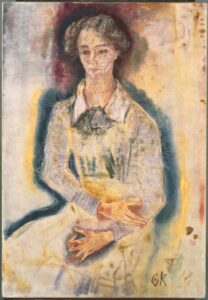
Portrait of Lotte Franzos 1909, (oil on canvas, 114.9 cm × 79.4 cm), The Phillips Collection, Washington, DC
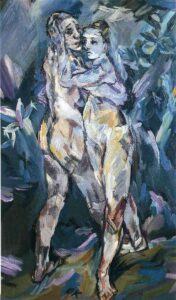
Lovers


| Mercedes de Acosta | |
|---|---|
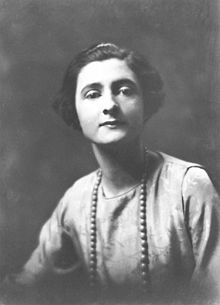
Arnold Genthe (1869-1942) Mercedes Hede de Acosta, 1919 or 1920
|
Today is the birthday of Mercedes de Acosta (New York City, March 1, 1893 – May 9, 1968 New York City); poet, playwright, and novelist. De Acosta wrote almost a dozen plays, only four of which were produced, and she published a novel and three volumes of poetry. She was professionally unsuccessful but is known for her many lesbian affairs with famous Broadway and Hollywood personalities and numerous friendships with prominent artists of the period.
She was described in 1955 by Garbo biographer, John Bainbridge, as “a woman of courtly manners, impeccable decorative taste and great personal elegance… a woman with a passionate and intense devotion to the art of living… and endowed with a high spirit, energy, eclectic curiosity and a varied interest in the arts.”
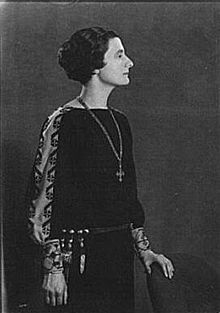
De Acosta was involved in numerous lesbian relationships with Broadway’s and Hollywood’s elite and she did not attempt to hide her sexuality; her uncloseted existence was very rare and daring in her generation. In 1916 she began an affair with actress Alla Nazimova and later with dancer Isadora Duncan. Shortly after marrying Abram Poole in 1920, de Acosta became involved in a five-year relationship with actress Eva Le Gallienne. De Acosta wrote two plays for Le Gallienne, Sandro Botticelli and Jehanne de Arc. After the financial failures of both plays they ended their relationship.
Over the next decade she was involved with several famous actresses and dancers including Greta Garbo, Marlene Dietrich, Ona Munson, and Russian ballerina Tamara Platonovna Karsavina. Additional unsubstantiated rumors include affairs with Pola Negri, Eleonora Duse, Katherine Cornell, and Alice B. Toklas.
It has been reported that she once stated, “I can get any woman away from any man” but there is no evidence to substantiate this claim.
De Acosta died at age 75 in poverty. She is buried at Trinity Cemetery in Washington Heights, New York City.
 And today is the birthday of Richard Wilbur (Richard Purdy Wilbur, New York City, March 1, 1921 – October 14, 2017 Belmont, Massachusetts); poet and literary translator. In my opinion, one of the foremost poets of his generation, Wilbur’s work, composed primarily in traditional forms, was marked by its wit, charm, and gentlemanly elegance. In 1987 he was appointed the second Poet Laureate Consultant in Poetry to the Library of Congress and he received the Pulitzer Prize for Poetry twice, in 1957 and again in 1989.
And today is the birthday of Richard Wilbur (Richard Purdy Wilbur, New York City, March 1, 1921 – October 14, 2017 Belmont, Massachusetts); poet and literary translator. In my opinion, one of the foremost poets of his generation, Wilbur’s work, composed primarily in traditional forms, was marked by its wit, charm, and gentlemanly elegance. In 1987 he was appointed the second Poet Laureate Consultant in Poetry to the Library of Congress and he received the Pulitzer Prize for Poetry twice, in 1957 and again in 1989.
Continuing the tradition of Robert Frost and W. H. Auden, Wilbur’s poetry finds illumination in everyday experiences. Less well-known is Wilbur’s foray into lyric writing. He provided lyrics to several songs in Leonard Bernstein’s 1956 musical, Candide, including the famous “Glitter and Be Gay” and “Make Our Garden Grow.” He also produced several unpublished works including “The Wing” and “To Beatrice”.
Wilbur died on October 14, 2017, at a nursing home in Belmont, Massachusetts from natural causes aged 96.
Verse
- Hebetude. It is a graph of a theme that flings
The dancer kneeling on nothing into the wings,
And Nijinsky hadn’t the words to make the laws
For learning to loiter in air; he merely said,
“I merely leap and pause.”- “Grace” in The Poems of Richard Wilbur (1963)
- Try to remember this: what you project
Is what you will perceive; what you perceive
With any passion, be it love or terror,
May take on whims and powers of its own.
Therefore a numb and grudging circumspection
Will serve you best — unless you overdo it,
Watching your step too narrowly, refusing
To specify a world, shrinking your purview
To a tight vision of your inching shoes,
Which may, as soon as you come to think, be crossing
An unseen gorge upon a rotten trestle.- “Walking to Sleep” (1969)
- What you hope for
Is that at some point of the pointless journey,
Indoors or out, and when you least expect it,
Right in the middle of your stride, like that,
So neatly that you never feel a thing,
The kind assassin Sleep will draw a bead
And blow your brains out.- “Walking to Sleep” (1969)
- What is the opposite of two? A lonely me, a lonely you.
- “Opposites” (1973)
- In each art the difficulty of the form is a substitution for the difficulty of direct apprehension and expression of the object. The first difficulty may be more or less overcome, but the second is insuperable; thus every poem begins, or ought to, by a disorderly retreat to defensible positions. Or, rather, by a perception of the hopelessness of direct combat, and a resort to the warfare of spells, effigies, and prophecies. The relation between the artist and reality is an oblique one, and indeed there is no good art which is not consciously oblique. If you respect the reality of the world, you know that you can approach that reality only by indirect means.
- As quoted by John Gery in Ways of Nothingness: Nuclear Annihilation and Contemporary American Poetry (1996)
- A thrush, because I’d been wrong,
Burst rightly into song
In a world not vague, not lonely,
Not governed by me only.- “Having Misidentified a Wild-Flower”
- Your hands hold roses always in a way that says
They are not only yours; the beautiful changes
In such kind ways,
Wishing ever to sunder
Things and things’ selves for a second finding, to lose
For a moment all that it touches back to wonder.- “The Beautiful Changes”
The Beacon
- Founded on rock and facing the night-fouled sea
A beacon blinks at its own brilliance,
Over and over with cutlass gaze
Solving the Gordian waters …
- The beacon-blaze unsheathing turns
The face of darkness pale
And now with one grand chop gives clearance to
Our human visions . . .
Love Calls Us To The Things Of This World
- The eyes open to a cry of pulleys,
And spirited from sleep, the astounded soul
Hangs for a moment bodiless and simple
As false dawn.
Outside the open window
The morning air is all awash with angels.
- Now they are rising together in calm swells
Of halcyon feeling, filling whatever they wear
With the deep joy of their impersonal breathing…
- The soul shrinks
From all that it is about to remember,
From the punctual rape of every blessed day,
And cries,
“Oh, let there be nothing on earth but laundry,
Nothing but rosy hands in the rising steam
And clear dances done in the sight of heaven.”
- The soul descends once more in bitter love
To accept the waking body
A World Without Objects is a Sensible Emptiness
- The tall camels of the spirit
Steer for their deserts, passing the last groves loud
With the sawmill shrill of the locust, to the whole honey of the
arid
Sun. They are slow, proud,
And move with a stilted stride
To the land of sheer horizon…
- O connoisseurs of thirst,
Beasts of my soul who long to learn to drink
Of pure mirage, those prosperous islands are accurst
That shimmer on the brink
Of absence; auras, lustres,
And all shinings need to be shaped and borne.
- Wisely watch for the sight
Of the supernova burgeoning over the barn,
Lampshine blurred in the steam of beasts, the spirit’s right
Oasis, light incarnate.
Mac Tag

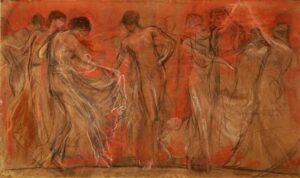
No Comments on "The Lovers’ Chronicle 1 March – the fall – art by Nikolaos Gyzis & Oskar Kokoschka – birth of Mercedes de Acosta – verse by Richard Wilbur"